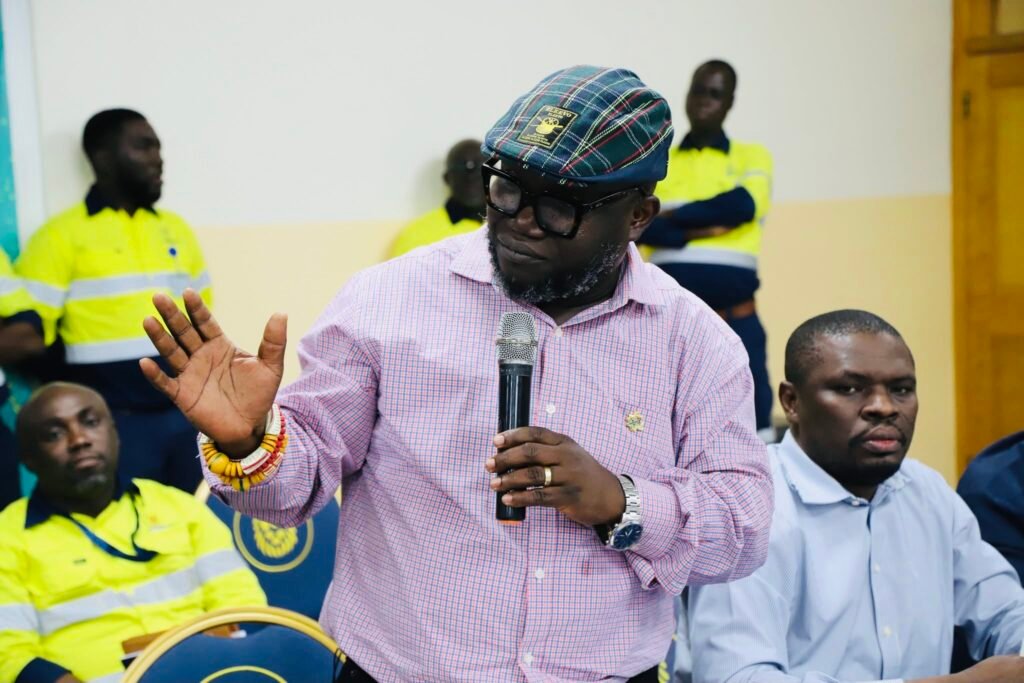The Parliamentary Select Committee on Lands and Natural Resources has commended Gold Fields Ghana for its consistency in delivering strong financial contributions to the state and impactful social investments in host communities.
The praise came during a working visit to the company’s Tarkwa mine, organised by the Ghana Chamber of Mines as part of efforts to strengthen collaboration between lawmakers and industry players.
Speaking during the engagement, Committee Chairman Alhaji Collins Dauda applauded the mining giant for setting a benchmark in fiscal responsibility.
“Since my tenure as Minister for Lands and Natural Resources, Gold Fields has been the only mining company that consistently paid dividends to the Government of Ghana.
“They have a good track record and must be commended for it.”
Committee Chairman Alhaji Collins Dauda
Gold Fields, one of Ghana’s leading gold producers, has earned a reputation for its transparency in revenue contributions and its commitment to community development projects.
The company has paid substantial dividends to the state in addition to its royalty and tax obligations, reinforcing its role as a reliable partner in Ghana’s economic development.

While acknowledging the positive contributions of Gold Fields, the Committee Chairman also raised concerns about delays in disbursing mineral royalties to traditional authorities and host communities.
According to him, bureaucratic bottlenecks in the royalty system often deny communities timely access to development funds, undermining the impact of mining revenues.
“The Chamber of Mines must take up advocacy for reforms in the disbursement of royalties.
“The delays create frustrations for communities that bear the impact of mining but do not see timely benefits. We need to make the system more efficient.”
Committee Chairman Alhaji Collins Dauda
The issue of royalty disbursement has long been a contentious one in Ghana’s mining sector.
While royalties are meant to support community development, delays in releasing funds have often slowed infrastructure and social projects in mining areas. Calls for a more transparent and predictable system have grown louder in recent years.
Chamber of Mines Welcomes Dialogue

The Ghana Chamber of Mines, which facilitated the visit, described the engagement as timely, particularly as Parliament is currently reviewing aspects of the Minerals and Mining Act, 2006 (Act 703).
Chief Executive Officer of the Chamber, Ing. Dr. Kenneth Ashigbey, emphasised that constructive dialogue between policymakers and industry stakeholders is critical for building a stable and competitive mining environment.
“For mining to achieve its full potential in Ghana, mineral revenues must be managed transparently and effectively.
“The people must see clear benefits, especially those in mining communities.”
Ing. Dr. Kenneth Ashigbey, Chief Executive Officer of the Chamber
Dr. Ashigbey added, “This strengthens the social licence for companies to operate while supporting national development.”
He reiterated the Chamber’s commitment to working with both government and companies to improve revenue management and ensure mining’s contributions are felt at both local and national levels.
The parliamentary visit formed part of lawmakers’ oversight duties, giving them the opportunity to assess first-hand the operations of Gold Fields, its challenges, and its contributions to the economy.
Committee members also interacted directly with community development projects funded by the company, ranging from educational infrastructure to health facilities and water systems.
Reliable Partner in Development

As Ghana seeks to maximise the benefits of its mineral wealth, the role of companies like Gold Fields is becoming increasingly central.
With a proven track record in both fiscal discipline and social responsibility, the company continues to distinguish itself in an industry where public trust is often contested.
Lawmakers noted that the Tarkwa visit had provided valuable insights into how responsible mining operations can align with national development objectives.
For communities and policymakers alike, Gold Fields’ consistency in paying dividends and investing in social projects was cited as a model for other companies operating in the sector.
As Parliament continues its review of the Minerals and Mining Act, stakeholders are optimistic that the reforms will address issues such as royalty disbursement, small-scale mining regulation, and local content participation.
In this evolving policy environment, Gold Fields’ partnership with government and communities may prove vital to securing mining’s social and economic licence in Ghana.
READ ALSO: Investors Snub T-Bills As Government Struggles to Raise GH¢6.7bn, Settles for GH¢3.2bn



















